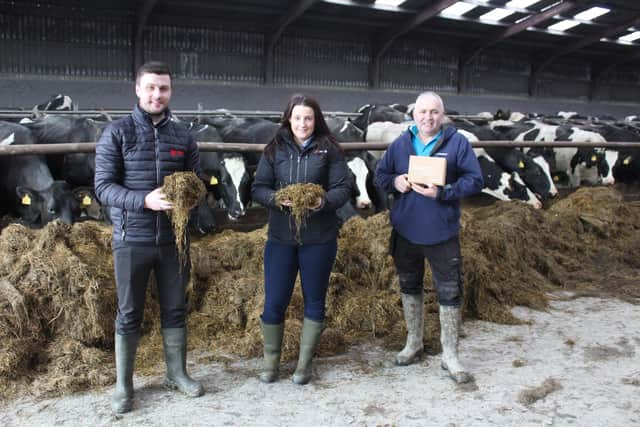New inoculant is helping to drive the quality of baled silages
and live on Freeview channel 276
There are two reasons for this. Firstly, a growing number of baler wrappers now have an inoculant application system incorporated with their specification.
But of equal significance is the fact that losses from baled silage are much lower than those achieved with clamp forages: 2% versus 20%.
Advertisement
Advertisement
As a result, using a proven inoculant on grass bales helps secure an enhanced return per tonne of silage produced.


Damian Gilmore is a case in point. He milks 165 Holstein cross cows at Ballygalget, close to Portaferry in Co Down. Damian farms with his father Gerard.
The cows are currently averaging over11,700L of milk per lactation from 3.3t of concentrate.
Milk output from forage is currently standing at 3,700L per head across the entire herd. The cows calve from the August through until the end of March.
Advertisement
Advertisement
By taking this approach Damian has managed to maximise the value of the winter production bonus available from his milk purchaser: Lakeland Dairies.
He explained: “Our aim is to get our total fat and protein output in the year above the average liveweight of the cows. That figure currently stands at around625kg.”
Getting such high levels of milk from grass has entailed making best use of grass and making high quality forage on the Ballygalget farm.
Significantly, Damian makes all his forage in bales.
He commented: “Normally, we take four cuts of silage each season. Up to last year, we did all the work ourselves. But with it being so difficult to get the additional labour that we needed, the decision was made to go with a contractor last year. But we still mow and ted the grass ourselves.
Advertisement
Advertisement
“Making bales suits the system that we operate. There is no diet feeder on the farm, as the cows get all the concentrates they need through the parlour.
“As a result we can put out 15 bales at a time, which will meet the entire milking group’s forage needs for up to three days.”
Ensuring that all the silage fed is of optimal quality represents a cornerstone of the management system, operated by Damian.
This level of commitment was fully rewarded through the Ulster Farmers’ Union silage awards. He achieved second place in the bales’ section of the competition.
Advertisement
Advertisement
Damian commented: “Last year we took four cuts. The first was taken at the end of April. The grass received a 24 hour wilt and was then baled. Getting high dry matter levels in early silages that can be very leafy is critically important.
“The late April harvest date then allowed us to secure an excellent second cut. However, we ran into real challenges later in the season, as a result of the very bad weather.”
Last year the majority of the bales made on the Gilmore farm were treated with Egalis™, the new inoculant from Alltech.
He continued: “I was very happy with the quality of the bales that we made last year, particularly given the very treacherous weather later in the season.
Advertisement
Advertisement
“The contractor we use has two balers, each fitted with an applicator. So applying the inoculant was not a problem at all.”
Aislinn Campbell, from Alltech, and Iain Dudgeon, from Mason’s Animal Feeds were recent visitors to the Gilmore farm. Mason’s manufactures the bespoke concentrate nuts that are fed to the cows on the farm. The company is working with farmers and Egalis™ recognising the importance silage quality has on herd performance.
Aislinn commented: “Egalis™ acts to secure a very fast pH drop within a clamp: the end result is lower dry matter losses and maximum nutrient retention, both within the clamp and at feed out.
“As a result, producers will have more and better silage to feed and fewer concerns about wasting feed.”
Advertisement
Advertisement
At a fundamental level, Egalis™ controls and drives forage fermentations through the use of highly efficient homolactic bacteria and elements that inhibit fungal growth.
The new product range brings together Alltech’s decades of expertise in fermentation, utilising bacterial strains specifically selected to maximise nutrient and dry matter protection.
Aislinn added: “Egalis™ was used for the first time in Northern Ireland last year. And all the reports back from farmers using the inoculant have been extremely positive.
“This level of feedback is highly significant, given the very extreme silage making conditions that characterised most of last spring, summer and autumn.”
Advertisement
Advertisement
Egalis™ has been developed by Alltech and independently trialled over the past number of years. This work has included a number of farm-based trials carried out on the island of Ireland.
Mason’s Animal Feeds has had a long-standing relationship with Alltech. Egalis™ brings together all the latest thinking and research findings, where the development of silage inoculants is concerned.
The Egalis™ grouping of products includes products that meet the specific needs of farmers and contractors committed to making high quality, grass, wholecrop and maize silages.
Included within the range is Egalis™ Ferment. Suitable for use on all forages, this new inoculant efficiently and rapidly drives fermentation to a stable, final pH.
Advertisement
Advertisement
It is comprised of Lactiplantibacillus plantarum and Pediococcuspentosaceus, which work synergistically to rapidly lower the pH to the required final pH irrespective of the dry matter content or the buffering capacity of the forage.
The benefits of using Egalis™ Ferment include maximising nutrient protection, reducing dry matter loss, and having more and better silage to feed.
Iain Dudgeon confirmed that sales of Egalis™ exceeded expectations last year.
He added: “We want to build on this very promising start in 2024.”